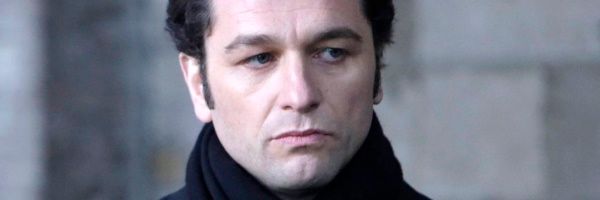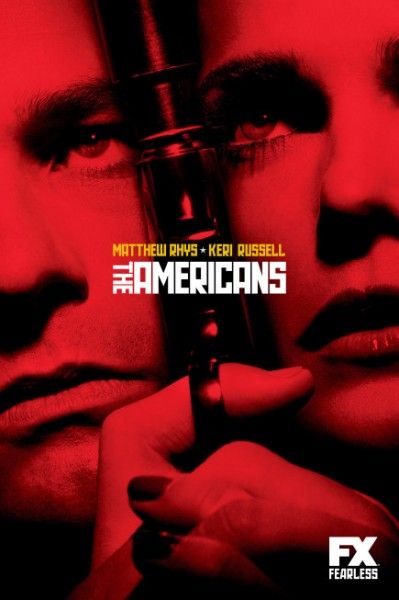The FX drama series The Americans follows the complex marriage of two KGB spies, Philip (Matthew Rhys) and Elizabeth (Keri Russell), posing as Americans in suburban Washington D.C., shortly after Ronald Reagan is elected President. On the Season 2 finale, entitled “Echo” and airing on May 21st, no one is safe, as Philip and Elizabeth evacuate their children while trying to complete their mission.
During this recent interview to discuss how the events in the finale will affect things, going forward, actor Matthew Rhys talked about how what happens at the end of the finale is going to bring division between Philip and Elizabeth, what it’s been like to play the changing family dynamic, why Philip is a more lenient and forgiving parent, how he approaches such a complex and complicated character, the most challenging aspect of doing this show, and whether he might ever direct an episode. Check out what he had to say after the jump, and be aware that there are some spoilers.
Question: What can viewers expect from the finale?
MATTHEW RHYS: There is an enormous about-turn in the last episode that keys up the third season, beautifully, in a way that’ll bring in a greater conflict for Philip and Elizabeth. Having seen them separated for the majority of the first season because of what they were going through, and then reunited for the second season, what happens at the end of the finale is going to bring such division between the two of them. It will be very interesting to see how they play that out. I think what’s so great about this season is the continuity of a storyline within every episode, and the great danger of a rogue force that’s uncontrollable. That plays beautifully to their paranoia, as a lifestyle that they can’t sustain, because they realize how dangerous their lives are becoming. They shooting at the end of Season 1 and the killing of the family at the beginning of Season 2 made them realize that they’re very fallible. They’re not untouchable.
This season, the dynamic in the family has changed so much, and Philip has to deal with Paige. How has that been to play?
RHYS: I think it’s another fantastic element that they brought to the show, and not just one that’s been added for good measure, but with real reason. You have two young children who’ve been lied to their entire lives and, all of a sudden, they’re coming of age. Their parents’ suspicious behavior, the long absences, and the phenomenal amount of laundry that they have to do are questions that are going to be raised. It seems to be a very natural progression. It raises questions in Philip, with Paige. He’s desperate for her not to take over a life of duplicity, deceit and lies. It pulls on him, emotionally, in an enormous way. That just makes it that much more interesting. It’s another great conflict within the family.
What went into creating the scene where Philip screams at Paige?
RHYS: The training that I received, many, many years ago when I was at college in London, was a very strong philosophy-based training, where your real and true emotion is used. There’s a term they used, called emotional memory or emotional callback. I just used something from my own past that was similar, that would elicit the same feeling. And then, you go through an emotional trigger that gets you to that base, so you access it quite easily. That was the primary focus for that scene. The pressure on Philip is enormous, and he realizes that his daughter is slipping out of his reach. In that way that so many of us do, you lash out because you feel helpless. That’s how I went about it.
Philip and Elizabeth have opposing views on Paige’s newfound religion. Why do you think it is that Philip is so much more lenient and forgiving than Elizabeth, both in parenting and on the job?
RHYS: I think for a number of reasons, really. His assimilation to the United States has been easier than Elizabeth’s. Though they were indoctrinated at a very early age, he’s come of age and realized that he has a family that he loves, and he wants to secure their future, but that’s threatened. However, he’s accepted the United States as a newfound freedom. There are a number of ex-trappings that he enjoys enormously. I think he’s easier on his children because there’s guilt about the lives they’re leading, and the deceit they’re feeding them. They were brainwashed, to a degree. Even if they are in opposition to him, he wants his children to have those choices to form who they are, independently, and to live the life they want to live, which is something he certainly wasn’t allowed. So, I think he allows them a greater freedom, and is that little bit more forgiving.
This show gets good ratings, but not as high as you would expect from the incredible quality of the show. Do you think that’s because Americans maybe have a hard time sympathizing with Russian spies, even as fictional characters? With the recent tensions with Russia, do you think that might spark more interest, or be more of an obstacle to people being able to sympathize with your characters?
RHYS: I’m not sure. I’ve spoken with people who couldn’t get into the show because they didn’t want to sympathize with Russian characters. I don’t know if that tends to be with a person of a certain age. But I think there’s a great success story in what the writers have done, in making the two main protagonists anti-heroes, in way in that you are obsessively rooting for the bad guy. What they’ve successfully done is made them fully fleshed and fully drawn out, very human characters. To be perfectly honest, I don’t know whether the troubles in the Ukraine would spark more or less interest in the show. I would agree that making your two main characters the enemies certainly comes with its challenges, but then I enjoy those elements in the show, with the way they do turn things on its head and ask an audience to question a little more.
Have you started filming Season 3 yet?
RHYS: We haven’t. I know the writers will soon be in a dark room in Brooklyn, figuring out what the third season will be about.
Do you think that Philip feels guilt over the people he’s killed?
RHYS: Yes, absolutely. I think part of what Joe Weisberg and Joel Fields, and all the writers, wanted to do was show that there’s an element where Philip and his feelings and point of view is the social conscious. Elizabeth has less of a hard time in killing because her belief in her mandate is so strong. From the first episode of the season, Philip is incredibly torn, as to where their future lies or where his beliefs and loyalties lie. So, I think the killing of people is now more of a survival instinct for Philip. It’s more so that the security of his family isn’t breached. That’s his primary goal in life. He has to be the best spy he can be, and if that means killing people to secure his family’s identity and future, then he’ll do that. That’s where his motivation comes from.
Do you do a lot of your own research for this show, or do you depend on the writing to develop the character for you?
RHYS: It feels, to me, like it’s an amalgamation of a number of things. Sometimes writers take from what they see and steer a character in that way. The evolution can be quite natural, in that there’s input from both parties. With the more technical-related issues, I’ll do my own research, or talk extensively with Joel, who always has great input because of his CIA background. In television, because you have a length of time, it does tend to evolve quite naturally from all parties.
What has been the most challenging part of doing this series?
RHYS: The accent is always a tricky part for me because such a large part of your brain is working towards that, so you have to stay on it, as much as possible. Just the physical filming of this series is incredibly difficult because of the scene count we have, the amount of days that we have to shoot, and the jumping from disguises. It’s a big juggling act, this series, especially at the pace with which we shoot. You have to keep your head sane, in the madness. You have to keep a focus on where you are in the arc of the season and just try to keep level-headed with the madness of it all.
You directed a few episodes of Brothers and Sisters. Any chance that you might direct an episode of The Americans?
RHYS: Foolishly or arrogantly or ignorantly, before starting shooting this series, I thought, “Oh, I’d love it if there was a possibility that I could direct an episode.” On Brothers and Sisters they’d also run me light in the episode I was directing. I was incredibly looked-after on that series. In this series, there’s absolutely no way that I could do both jobs without either killing myself or using incredibly heavy drugs.
The Season 2 finale of The Americans airs on FX on Wednesday, May 21st.


